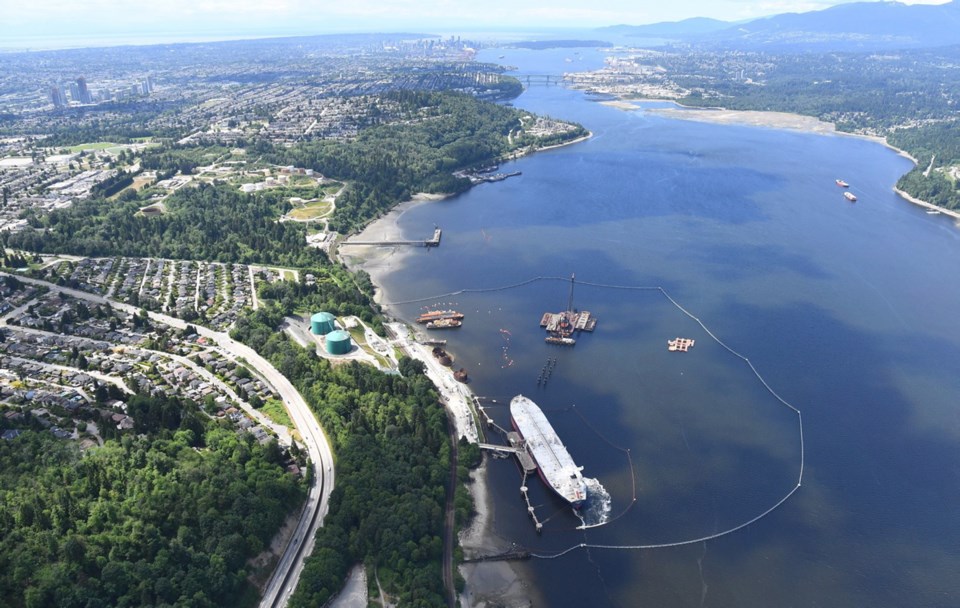 Be careful what you ask for, goes the old adage. The NDP government floated the idea last year of B.C. stepping in and regulating interprovincial heavy-oil movements.
Be careful what you ask for, goes the old adage. The NDP government floated the idea last year of B.C. stepping in and regulating interprovincial heavy-oil movements.
Then it paused and backed up to ask the courts whether it had the power to do so. The answer came back Friday — absolutely not.
It looks like a major loss, because it is. But there were a couple of advantages to sending the reference question to the judges.
The idea of regulating heavy oil was couched in generic terms. It referred to possible curbs on just proposed increases, while new environmental standards were considered. But it was aimed unmistakably at the Trans Mountain pipeline expansion.
The NDP had campaigned to use “every tool in the toolbox” to stop that project. When they took power, government lawyers told them they had no authority to do so. (That turned out to be an early clue about Friday’s decision.)
Environment Minister George Heyman was forced to admit in the house that fulfilling that promise would have been “inappropriate and unlawful.”
In April 2018, he told the legislature: “It became clear, through listening to legal advice, that we did not have the authority to stop a project that had been approved by the federal government within its jurisdiction.”
So B.C. was obligated to continue issuing routine permits. The idea of curbing additional heavy-oil movements while doing research was a kind of fallback resistance move.
It enraged everyone in Alberta, government and opposition combined. The previous government there retaliated instantly by imposing a boycott on B.C. wine in Alberta liquor stores.
That’s what prompted B.C. to take a step back, and ask the court for a ruling on whether it had jurisdiction.
The wine boycott was suspended, in return.
So the NDP was saved from accusations that it was leaving the wine industry to die on the vine.
The reference question also brought 15 months more uncertainty over the pipeline.
As far as the NDP cabinet was concerned, that was a big plus.
It turned out that uncertainty would have continued regardless, as the project hit procedural setbacks. Questions will continue to hang, as B.C. will appeal the decision to the Supreme Court of Canada.
Anything can happen in a courtroom, but reversing Friday’s decision there would amount to a major upset of most expectations.
The B.C. Court of Appeal ruling is 50 pages of reasoning in which all five judges who heard the case unanimously concluded B.C.’s plan is out of bounds.
The proposed regulation is “an immediate and existential threat to a federal undertaking that is being expanded specifically to increase the amount of oil being transported through British Columbia. This can hardly be described as an ‘incidental’ or ‘ancillary’ effect,” the court said.
Having defined the stakes, the court said the regulation crosses the line between provincial and federal jurisdictions.
“Even if it were not intended to ‘single out’ the pipeline, it has the potential to affect (and indeed ‘stop in its tracks’) the entire operation of Trans Mountain as an interprovincial carrier and exporter of oil.”
And by definition and law, an interprovincial carrier and exporter of oil is under federal jurisdiction, it said.
“Unless the pipeline is contained entirely within a province, federal jurisdiction is the only way in which it may be regulated.”
If it’s any consolation to the NDP cabinet, the government stands a much better chance in a related court case in Alberta. After the short-lived wine boycott, that province also retaliated with the “turn off the taps” bill.
It gives that government full control over what goes into the existing pipeline, with the explicit intention of adjusting the flow to drive pump prices in B.C. sky-high.
If B.C.’s regulation is offside, Alberta’s law isn’t even in the constitutional arena. All the rhetoric behind the bill made clear it’s designed to punish another province.B.C. challenged it, but was dismissed because the law wasn’t fully in force.
Jason Kenney’s government is ready to activate it, and then a new challenge will be filed immediately.
It will likely succeed, but that would be a win on a side issue. The main event is headed to the highest court.



